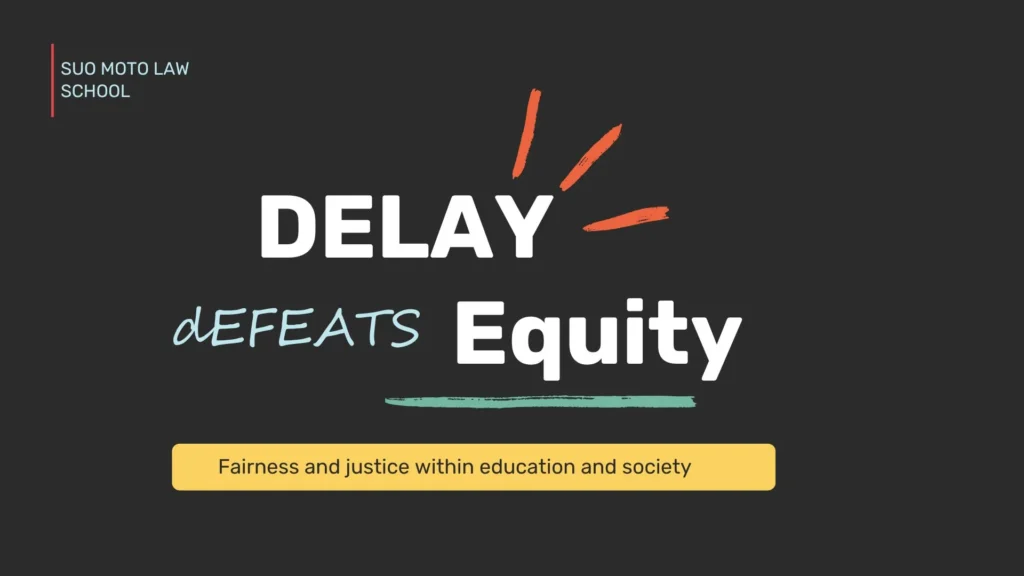“Delay defeats equities” is an important maxim of equity law, emphasizing the point that those who neglect their rights may lose them. This article explores its meaning, application, the doctrine of laches, and case law. It also highlights when delay will be deemed fatal and also covers the grounds of exceptions to the maxim and its recognition in Bangladesh. The discussion is based on B.M. Gandhi’s book, providing legal insights into how courts interpret and apply this principle.
Meaning of Delay Defeats Equities
It is an undisputed axiom that eternal vigilance is the price of liberty. If one sleeps upon his rights, his rights will slip away from him. Equity aids the vigilant and not the indolent. Where an injured party has been slow to demand a remedy for a wrong he has long regarded with apparent indifference, the court will decline to give him that remedy on the grounds of public policy. The delay sufficient to prevent a party from obtaining an equitable remedy is technically called laches. Thus, legal claims are barred by statutes of limitation, and equitable claims may be barred not only by limitation law but also by unreasonable delay, called laches.
Application
This maxim applies only when a claim is made for equitable relief. In cases that are governed by statutes of limitation either expressly or by analogy, the maxim will not apply. Such cases fall into three categories, as noted by Snell:
- Firstly, those equitable claims to which the statute applies expressly,
- Secondly, the statute applies by analogy
- In the third instance, there are equitable claims to which the statute does not apply and hence they are covered by ordinary rules of laches. Dr Hanbury puts the idea in this way: In cases of purely equitable claims, equity courts have discretion either to grant or to refuse the equitable relief, unless the equitable claim is expressly covered by a statute.
The doctrine of Laches
The plaintiff’s unreasonable delay is a weapon of defense by the defendant against the plaintiff. If the plaintiff is passive and apathetic to his rights for a considerably longer time than prescribed, his delay does not remain a mere delay but a delay that has worked to his disadvantage. Where a long time has elapsed, even beyond the statutes of limitation, and the plaintiff has never insisted upon his rights, and therefore neither the statute applies nor can the analogy be invoked, one has to look to the delay and the surrounding circumstances, which provide an explanation for the delay and a basis of interference for the court.
Suppose the inference that can be reasonably drawn is that the plaintiff agreed to abandon or release his rights or acted in a manner as to induce other parties to alter their position on the reasonable faith that he has done so. In that case, the matter is over because the plaintiff’s claim will be treated as abandoned. In such cases, the lapse of time and delay are most material. But apart from such circumstances, the delay will be immaterial.
But for deciding whether there is inexcusable delay or not, there is no readymade rule of formula because so many facts have to be considered, e.g., the nature of the claim, the character of the claimant, and the subject matter of the litigation. Moreover, ignorance of the rights, undue influence, and disability would form a satisfactory explanation for delay. It should be noted that laches is a personal disqualification and will not bind successors-in-title.
Cases
In the case of Chatrabhuj vs. Mansukhram, AIR 1925 Bom 183, the plaintiff allowed his land to be occupied by the defendant, and this was acquiesced by him even beyond the period of limitation. In a suit by the plaintiff for possession of the land, it was decided that as the period of limitation to recover possession had expired, no relief could be granted.
In the same way, if A seeks to set aside a contract of purchase, he must apply for relief within the limitation period. But where he makes unreasonable delay and during that time other parties have acquired rights or where the property in question has deteriorated in value or where conditions are changed, the court will refuse rescission.
Delay When Fatal
In the following three cases, the delay is fatal for a party desirous of enforcing his right:
- As a result of delay when the available evidence is lost or destroyed.
- When the other party is induced to assume or draw an inference from one’s conduct that one has waived his rights.
- The delay provides ground to the other party and leads him to believe that one has agreed to abandon or release his rights.
Limitations of the Maxim
Delay is not fatal in the following circumstances, and they form the exceptions to the maxim so that the maxim does not apply to them:
- Where the law of limitation expressly applies.
- Where it applies by analogy.
- Where the law of limitation does not apply but the cases are governed by ordinary rules of laches.
Latches and Acquiescence
Acquiescence is an assent to an infringement of rights, either express or implied from conduct, by which the right to equitable relief is normally lost. On the other hand, delay sufficient to prevent a party from obtaining an equitable remedy is technically called latches.
Recognition in Bangladesh
The doctrine has therefore no general application to Bangladesh but has only limited scope. Where there is a long lapse of time in challenging the defendant’s title, the presumption would be that it had a lawful origin, and the court would fill in the details obliterated by time. In case of costs, latches may be grounds for refusal.

